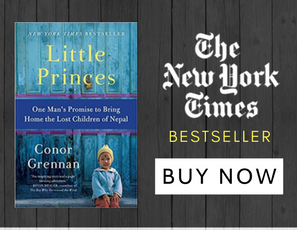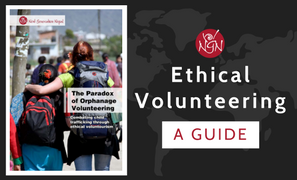Written by Martin Punaks, Nepal Country Director
I am sitting in a café in Kathmandu drinking cups of tea while Farid drags on a cigarette. We are strategizing on the future of NGN in Nepal. My first task as Country Director is to design a plan for how we completely abolish child trafficking into illegal orphanages—no small task! Farid is tired and will soon be returning to France. He has dedicated six years of his life to helping exploited Nepali children, and despite changing the lives of nearly 500 families, he still doesn’t consider it enough. “We have to end it Martin,” he tells me. “We have to change the people themselves who allow these terrible things to happen.” Every idea we come up with is thwarted by obstacles: a corrupt person, a poor family who are unaware of what will happen to their child when that “nice man” takes them away. Every night I arrive home late to my own family, worried about whether I have an impossible task.
This is not the first time I have felt this way. I lived in India and worked with child laborers rescued from factories. I witnessed the ignorance, corruption and complacency that created their situation. The kids we rescued were just a drop in the ocean out of the 60 million child laborers that existed in India. It was depressing.
A week later I get a phone call. An old friend and colleague from Delhi—one of India’s leading child rights activists—is in Kathmandu for a night! We order in pizza (from the city’s only take-away, run by an Italian-American) and we talk long and hard. He tells me that since I left India things have begun to change: the police now work hand-in-hand with the campaigners, the laws are being implemented properly and, most importantly, attitudes amongst the Indian public have turned against child labor. It is wonderful to hear. “When you lived in India, Martin, we could not see the changes we were making, but they were being made, and now we are witnessing the results.”
The next day I wake up with a smile on my face. I cycle to the NGN office and wish my Nepali colleagues a good morning. Many of them are young and idealistic, and they have chosen to dedicate their skills to improving their country. They risk their lives in the mountains searching for families, and they work late into the night to prepare important reports. It is then that it hits me that they are the answer I have been looking for. Our plan for NGN needs to empower more Nepalis like them, enablingthem to be the change that Nepal so desperately needs. If Indians can change India, then Nepalis can change Nepal. This will be the NGN strategy: to empower Nepali families, ordinary citizens, NGOs and the Government to be the change that stops child trafficking.
One day, I hope that an old Nepali friend visits Farid in France and tells him that the work that he and Conor started in 2006 was the beginning of the change we were all hoping for.






